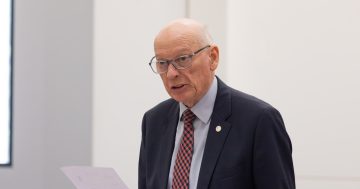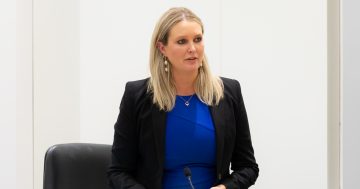
The ACT Government is encouraging clubs to move away from gaming machines as their primary source of revenue. Photo: duallogic.
The ACT Gaming Minister is receiving advice on changing legislation to give families connected to cases being investigated by the ACT Gambling and Racing Commission more updates.
It follows media reports about the death by suicide of Canberran Raimon ‘Ray’ Kasurinen and alleged breaches by his gambling venue of choice, the Hellenic Club.
It’s been claimed Mr Kasurinen had been offered free food and drink to keep using poker machines at the venue. It’s believed he took his own life, in part, as a result of his gambling.
While the commission doesn’t investigate deaths that may be gambling-related, it does investigate alleged legislative breaches by venues where gambling can occur.
It’s understood it is still investigating the alleged breaches in relation to Mr Kasurinen, four years after his death.
A government spokesperson stated the commission does not comment on matters that may be under investigation but that it takes all complaints and allegations seriously.
“Factors affecting the time taken to conduct an investigation include the amount and type of evidence required to be gathered and the complexity of the matter being investigated,” they said.
“The Gaming and Racing Control Act 1999 prohibits the commission from disclosing information in relation to a complaint, which prevents us from providing updates even to the complainant.
“The legislation also sets out the conditions under which the commission may give the complainant information about the results of an investigation once the matter is finalised.”
Gaming Minister Shane Rattenbury said that since details of Mr Kasurinen’s case had been made public, he had sought advice from the commission on potential law changes to speed up investigations and allow more updates to complainants and their families.
“Investigations [of this nature] can be very complex and take up a lot of time,” he said.
“Families would probably feel more comfortable if they’re able to receive more updates.”
Mr Rattenbury said he understood restrictions in legislation may not be meeting community expectations.
Assessments will also be considered to see if more investigators need to be recruited for the commission.
It’s a change that would be welcomed by ClubsACT.
CEO Craig Shannon said he couldn’t understand why this investigation was taking so long.
“At the end of the day … a cloud has been hanging over this family and the club for four years,” he said.
“Updates are great, but why would you need updates over a four-year period? It shouldn’t take that long.”
The ACT Government has embarked on a four-week ‘market sounding’ to gather information about a potential central monitoring system (CMS), which could connect all Territory poker machines to monitor their operation.
It could also allow for a consistent rollout of harm reduction initiatives such as bet and load-up limits, which are some of the gambling-related reforms identified in the current Parliamentary and Governing Agreement (PAGA).
A discussion paper was released about the system in 2022, with the market sounding to help identify potential costs and new technology that may have emerged since CMSs were adopted in other jurisdictions. It could cost about $70 million over 15 to 20 years.
“All advice I have is [that a CMS] is essential infrastructure to reduce gambling harm,” Mr Rattenbury said.
“Personally, I’m convinced we need to bring this in.”
The ACT is the only state or territory without linked poker machines.
The CMS has the support of the Alliance for Gambling Reform. CEO Carol Bennett said would be an “important step” as it could provide information about who is gambling, when and how much, and can flag those at risk of gambling harm.
But she said the government could also be going further.
“There are various measures the government could be taking, such as reduced opening hours, removing signage from poker machine venues, slower spin rates (etc), but ultimately, the most effective measure will be a cashless gambling card with binding and default limits that enables every individual to be identified,” Ms Bennett said.
“Regulation of poker machines needs much overdue reform in the ACT. With losses totalling $1.2 billion in the last decade, we can’t afford for the government to sit on its hands on this.”
But the CMS has its doubters.
Labor backbencher and gambling reform advocate Dr Marisa Paterson doesn’t support implementing the system, stating that while it could unlock the ability for other harm reduction capabilities and is more comprehensive, she felt it would encourage poker machines to keep existing in the Territory, given the CMS would be tied to them.
“To me, the two policies are in direct opposition … my argument is: what is our long-term vision? Do we want some machines or none?” she asked.
“If the objective is to reduce gambling harm, to me, having less or no machines is the better outcome.”
She argued that clubs could implement their own monitoring schemes and be helped by reforms such as cashless gaming and mandatory pre-commitments.
Dr Paterson also felt the self-exclusion issue “ball has been dropped”.
“People are experiencing serious harm from gambling and we are not progressing,” she said.
ClubsACT is also against a CMS, arguing the predicted cost was too high.
Mr Shannon said they wanted “cost-effective and impactful” harm reduction measures rather than a “smokescreen” policy.
He argued that while the government may have ambitions about what the CMS could do, he hadn’t heard of any other jurisdiction using the system to implement other harm minimisation reforms.
“We’re a small jurisdiction with about 3500 machines. That’s one reason why we don’t have a CMS; it’s not an effective solution for such a small number of machines.”
A committee inquiry is underway into cashless gambling cards for the ACT, and public hearings will be held next week.
The ACT Government has not committed to implementing a CMS and the market sounding won’t directly lead to the procurement of a system.
If this story has raised concerns or issues for you, contact Lifeline on 13 11 14. ACT Gambling Support Service can be reached 24/7 on 1800 858 858.





















